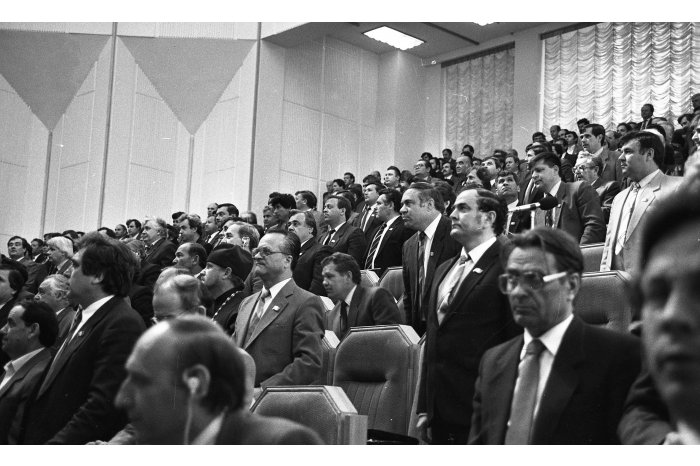23 June 1990. Parliament adopts Declaration on Sovereignty of Moldova
12:02 | 23.06.2021 Category:
The June of the 1990 year was productive for the parliament and the character of decisions adopted emphasized the ever deeper dissensions between the centre and the Soviet Union republics. A meeting held in Moscow, chaired by Mikhail Gorbachev, proved that the Kremlin was ready to cede a part of its powers to the republics, in order to prevent the chaotic disintegration of the USSR.
The Moldovan parliament in June forced several decisions which revealed the political course towards the gradual acquiring of the political independence. In several months alone, the national radio and television were set up, the Moldovan Telegraphic Agency was liquidated, which promoted Moscow’s interests and the Moldova-pres National Agency was created, the press body of the parliament was established, the newspaper Sfatul Țării (Country Council) and the opinion on the political and legal assessment of the Ribbentrop-Molotov pact as to Bessarabia and north Bucovina, was adopted.
Yet, the most important document from the political viewpoint was the Declaration on Sovereignty. The draft’s text was prepared quite thoroughly and all aspects of the de facto separation from the Soviet Union centre were taken into account in it. The MPs from Moldova’s eastern districts and the representatives of the Inter-front from Chisinau made desperate efforts to block this document. The approach against the sovereignty was articulated by the experienced jurist, university professor Yakovlev. Yet, the young jurists had invincible arguments, among which the lack of a political and legal act on the creation of the Moldovan Soviet Socialist Republic (RSSM) and on the becoming member of the USSR, the need of a status of sovereign subject, in order to start negotiations with the centre.
The Declaration on Sovereignty established the nature, character and type of our state. These elements could not exist without the indispensable condition of the sovereignty. The sovereignty was based on the source of power of a state – the people and the parliament represents the people’s will directly and exclusively, the Declaration read. Therefore, the legislative body is independent from the laws and decisions of other states. Thus, a legal norm was introduced, under which no law or decision by Moscow cannot enter into force in Moldova without its ratification by the Chisinau legislative body.
The Declaration on Sovereignty clearly stipulated that Moldova is a unitary and indivisible state and nobody has right to assume territory or wealth of the country. This provision directly regarded the breakaway authorities from the left bank of Dniester and eliminated the so-called property of the Soviet Union.
As for the foreign relations, Moldova declared its right to independently establish international relations and become subject of the international law. This was a provision which fundamentally undermined the then exclusive prerogatives of Moscow to promote a single foreign policy.
The Declaration on Sovereignty clearly introduced the notion of separation of state powers, regulated the state-citizen relation and approached the state’s nature from the viewpoint of the European liberal and democratic values. This was an extremely courageous step, given that the centre and most Soviet Union republics were not tackling this subject, which generated the processes of the countries’ de-Sovietizing and de-Communization.
An extremely important provision of the Declaration on Sovereignty was the proclaiming of the Moldovan citizenship. In this respect, the discussions were particularly harsh in parliament. The supporters of the USSR’s preservation suggested a compromise which was against the essence of the notion of sovereignty. They vehemently insisted on the existence of dual citizenship: Soviet and Moldovan; yet, the firm position and the professional approach of the authorities of the text of the Declaration on Sovereignty persuaded the parliament to adopt a single citizenship - the one of Moldova. The Declaration on Sovereignty was adopted by majority vote.
The importance of the Declaration on Sovereignty is difficult to be underestimated. This was a huge step in the achievement of the goals from the programmes of most MPs, voted by citizens in the uninominal electoral constituencies and which directly expressed the people’s will.
”The Declaration on Sovereignty was the first substantial victory towards the liberation of Moldova from Moscow’s pressure,’’ the then parliament speaker, Mircea Snegur, said.
Yet, hard times followed for Moldova. The separatists from eastern Moldova, directly backed by Moscow, set up para-military units which received weapons and ammunition from stocks of the 14th Russian Army, forcibly took over the control over the local authorities and created unbearable conditions for the work of the constitutional law-enforcement bodies.
Nevertheless, the Declaration on Sovereignty created a solid foundation for other type of relations with Moscow and Gorbachev was ceding one position after another. The failed coup d’etat from August 1991 accelerated the processes of the USSR’s disintegration and created real premises for getting the independence. The Declaration on Independence from 27 August 1991 is based on the solid foundation of Declaration on Sovereignty and represented the crowning of the efforts and aspirations of a generation which will certainly enter the history as the ‘’independence generation.’’
Chisinau, 23 June /MOLDPRES/.

